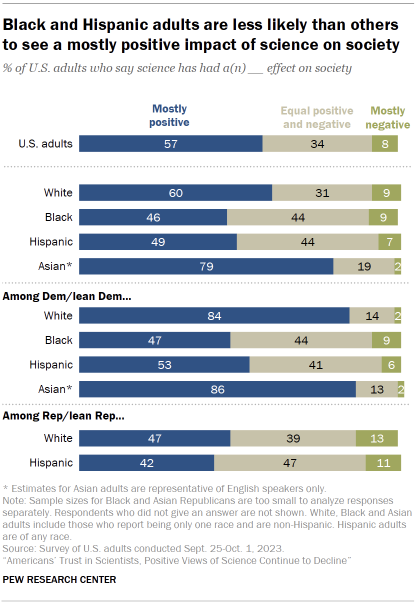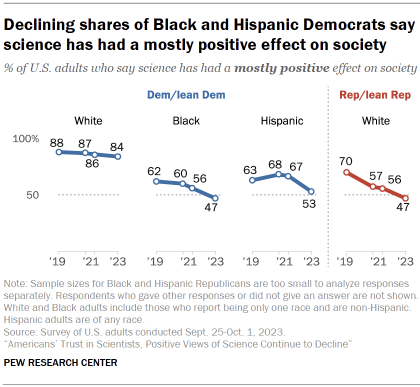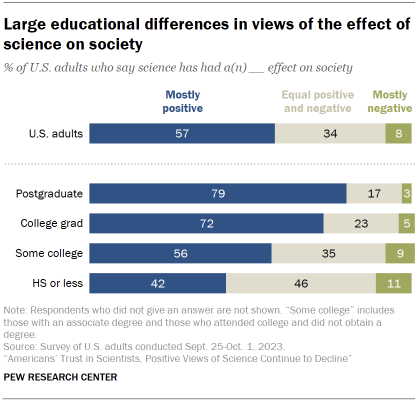
The share of Americans who say science has had a mostly positive effect on society has declined in recent years. In the new survey, 57% say science has had a mostly positive effect on society, while 34% say science has had about equal positive and negative effects and 8% say science has had a mostly negative effect. Positive ratings of the impact of science are down 8 percentage points since November 2021 and down 16 points since 2019.
Democrats have now become much more likely than Republicans to say science has had a mostly positive impact on society (69% vs. 47%). This gap is the result of steeper declines in positive ratings among Republicans than among Democrats since 2019 (down 23 points and 8 points, respectively).
Race and ethnicity and views on societal impact of science
Views of the impact of science on society differ across racial and ethnic groups, with Black and Hispanic adults offering less positive assessments than other groups.

Overall, 79% of Asian adults and 60% of White adults say science has had a mostly positive impact on society.
By contrast, 49% of Hispanic adults say science has had a mostly positive effect on society, while nearly as many (44%) say its impact has been an equal mix of positive and negative. Views are similar among Black adults: 46% describe the impact of science as mostly positive, compared with 44% who say it’s been a mix of positive and negative.
Among Democrats, large majorities of Asian Democrats (86%) and White Democrats (84%) say science has had a mostly positive effect on society. By comparison, Hispanic Democrats (53%) and Black Democrats (47%) are more than 30 points less likely to say the impact of science on society has been mostly positive.
This survey includes a total sample size of 653 Asian adults. The sample primarily includes English-speaking Asian adults and, therefore, may not be representative of the overall Asian adult population. Despite this limitation, it is important to report the views of Asian adults on the topics in this study. As always, Asian adults’ responses are incorporated into the general population figures throughout this report.

The gap in views between White Democrats and Black and Hispanic Democrats has grown significantly over the past few years due to declines in the shares of Black and Hispanic Democrats who say the impact of science on society has been mostly positive. (There is insufficient sample size in past Center surveys to analyze the trend for Asian Democrats.)
The share of White Republicans who say science has had a mostly positive impact on society has declined steadily from 70% in 2019 to 47% in the current survey. (A large majority of Republicans are White. Sample sizes of Republicans of other races are too small to analyze responses separately.) White Republicans are now 37 points less likely than White Democrats to view the impact of science positively; in 2019, this gap was 18 points.
Education and views on the societal impact of science

Americans with higher levels of education are especially likely to say science has had a mostly positive effect on society. About eight-in-ten adults with a postgraduate degree say this, as do 72% of those with a bachelor’s degree.
A smaller majority of Americans with some college education say science has had a mostly positive effect on society (56%). And fewer than half of those with a high school diploma or less education hold this view (42%).
Within both parties, adults with higher levels of education offer more positive ratings of the impact of science on society than those with lower levels of education.




